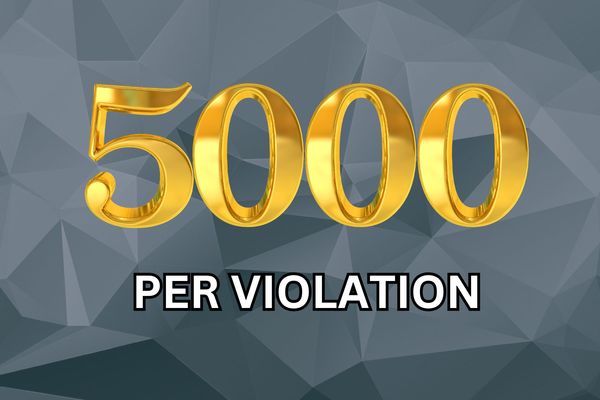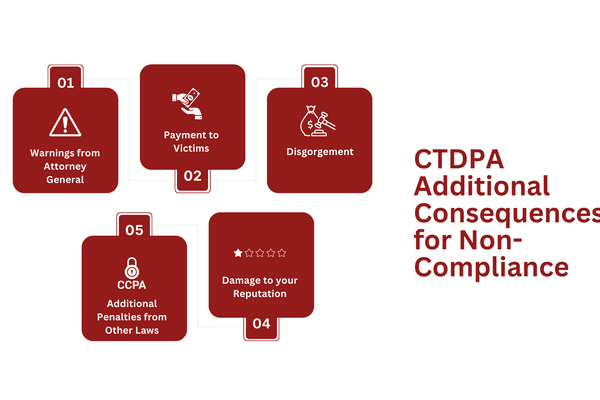
Created by Governor Ned Lamont, the state of Connecticut joined with four other states in creating a state-wide data privacy law called the Connecticut Data Act. Your business should understand this law inside and out to avoid the Connecticut Data Act fine, which can cost non-compliant businesses a lot of money. Now they are also working on a Connecticut AI Act and could be one of the only initial states to have state level regulations for AI that everybody using AI will have to follow.
The Connecticut Data Privacy Act is similar to other states’ data privacy laws and applies to many businesses in the U.S. Unlike other countries, the U.S. does not have one overarching data protection law (yet), so states must make their own.
This means businesses that process data must navigate the requirements of each law covering the consumers you collect personal data.
To help you, this article will cover the CTDPA in detail, potential fines and consequences for non-compliance, possible exemptions, and tips to ensure your business achieves CTDPA compliance.
- Enforcement is evolving:
- The CTDPA is relatively new, and enforcement actions are still developing.
- As of January 1, 2025, the cure period is no longer automatic, which will likely increase enforcement actions.
- Case details:
- Specific details of enforcement actions, including exact fine amounts, may not always be publicly released. So there’s millions in fines doled out that you are not aware of.
- Enforcement by the Attorney General:
- The Connecticut Attorney General’s office is responsible for enforcement, and they have discretion in how they pursue violations.
Helpful information about the potential penalties and the types of violations that could lead to fines:
Key points about CTDPA penalties:
- Civil penalties:
- Up to $5,000 per willful violation, under the Connecticut Unfair Trade Practices Act.
- Other potential remedies:
- Injunctive relief (court orders to stop certain practices).
- Restitution (returning money or property to affected consumers).
- Disgorgement (requiring a company to give up profits gained from violations).
Types of violations that could lead to fines:
Here are some examples of actions that could lead to CTDPA violations and, consequently, fines:
- Failure to provide consumers with clear privacy notices: Not informing consumers about the data being collected and how it’s used.
- Failure to obtain consumer consent for data processing: Processing sensitive data without proper consent.
- Failure to honor consumer rights requests: Not allowing consumers to access, correct, or delete their personal data.
- Selling personal data without proper authorization: Disclosing personal data to third parties without consent.
- Failure to implement reasonable data security measures: Not protecting personal data from unauthorized access or breaches.
- Discrimination against consumers who exercise their privacy rights: Denying services or charging higher prices to consumers who opt out of data collection.
- Failure to conduct data protection assessments: Not evaluating the risks of data processing activities.
- Processing data for purposes not disclosed in the privacy notice: Using data in ways that consumers were not informed about.
- Failure to limit data collection to what is adequate, relevant, and necessary: Collecting more data than is needed.
- Continued violation after the cure period has expired: After the expiration of the cure period, and after being notified of violations by the attorney general, continued violations will result in fines.
Key Takeaways about the CTDPA
Any business that processes data while selling goods/services in Connecticut or to Connecticut residents that processed data of more than 100,000 consumers or 25,000 consumers and derived 25% of their revenue from selling that data is subject to the CTDPA.
The maximum fine for a CTDPA is $5,000 per violation. The Connecticut Attorney General can pursue further legal action against non-compliant businesses that may result in even higher fines.
Your business can avoid these fines by creating an effective privacy policy and consent mechanism, conducting regular risk assessments, implementing data security measures, preparing data breach protocols, employee training, and consulting with Captain Compliance.
Connecticut Data Privacy Act (CTDPA) Explained

The Connecticut Data Privacy Act was signed on May 10, 2022 and become effective on July 1, 2023. It protects Connecticut residents by granting them extensive control over their personal data.
Similar to the other state data privacy laws in the U.S., like the CCPA, consumers are also granted specific rights they can exercise anytime.
This law is part of the ever-growing list of compliance frameworks worldwide that regulate data processing to protect consumers’ personal data.
The scope of the CTDPA includes any business that firstly sells products or services in Connecticut or processes data of Connecticut residents during the previous year – but another condition also has to be met.
The business must also either process the personal data of more than 100,000 consumers or process the personal data of more than 25,000 consumers and derive more than 25% of their revenue from selling this data, then the CTDPA applies to them.
The Connecticut Data Privacy Act is a part of the movement that individual states are joining to enhance data privacy. Since states are each making their laws, if your business operates nationally, you must understand and comply with each one.
Luckily, these laws overlap, and you can comply with multiple by following some general principles. The specific consumer rights in the Connecticut Data Privacy Act are similar to other laws.
To avoid fines for violating any law, your business must provide consumers with certain data subject rights if you collect and process any sensitive data or personal information from them.
Connecticut Data Act Fine

The Connecticut Attorney General enforces the Connecticut Data Privacy Act and charges businesses up to $5,000 per violation. This limit applies to every intentional violation of the CTDPA and all businesses under its scope.
Fines are determined case by case and are entirely up to the discretion of the attorney general. In addition to hefty fines, there are additional consequences that the attorney general can inflict on businesses that may lead to even bigger payouts.
To help your business navigate the CTDPA requirements, you can outsource your compliance needs to professionals like us. Our team of experts will help ensure your business stays in line with the CTDPA and all other data privacy laws that affect your business to avoid significant fines and other harmful consequences.
CTDPA Additional Consequences for Non-Compliance

On top of the already mountain-like fines that the Connecticut Attorney General can place on your business, it has other equally damaging alternatives.
If you thought the money was enough, here are the additional consequences that the Attorney General can place on your business upon every violation of the CTDPA.
Warnings from Attorney General
Suppose the Attorney General finds your business non-compliant with any section of the Connecticut Data Privacy Act. In that case, they can warn your business to make necessary adjustments.
If your business does not make the proper adjustments in the allotted time (60 days for the Cure Period), the Attorney General has the right to pursue further legal or financial action against you.
Payment to Victims
Depending on the scale of your data privacy violation, the Attorney General can order your business to pay out the victim directly. This payment is not optional and will be legally required for your business.
If you expose sensitive data or critical personal information, the Attorney General will make you pay accordingly, which could cost more than the $5,000 limit set on initial violations.
Disgorgement
An alternative to paying the victim directly with your business’ money is disgorgement. Disgorgement is a legal process that requires your business to repay all of the illegally (or obtained without consent) acquired profits.
The profits are paid in full with no exceptions, and if you gained more than your business currently has, there is no chance for an altered cost. These payments are typically enhanced with interest.
Damage to your Reputation
In addition to fines and penalties that can harm your business’s revenue and cash flow, the stigma is attached to businesses that do not comply with data privacy laws. If your business does not appear to put effort into protecting consumers’ personal data, they will be less likely to trust you, and you can lose potential revenue.
Even if your business does not get officially charged for a CTDPA violation, warnings from the Attorney General or data breaches can cause consumers to question how safe their personal data is in your hands.
Ensuring your compliance with the CTDPA will provide a standard of data privacy and data protection in your business that not only meets regulatory standards but that you can use to show consumers your commitment to protecting their data.
Additional Penalties from Other Laws
Any violation of the Connecticut Data Privacy Act will result in fines issued by the Connecticut Attorney General. However, the penalties may not end there. The CTDPA has many overlapping rules with other data privacy laws in other states.
As a result, if you violate the CTDPA, chances are you are violating another state or country’s privacy laws as well. Unfortunately, there is no limitation on how many privacy laws you can violate at once or how many penalties you can face.
CTDPA Cure Period Explained
As the Connecticut Data Privacy Act was recently created and signed into action, the Connecticut Attorney General has implemented a “cure period” for businesses. If your business violates the CTDPA, you will receive a notice from the Attorney General.
Your business is then granted 60 days to cure or mend the violation before receiving a penalty or fine. The cure period is an effort to allow businesses time to adapt to the new regulation, but it will not be around forever.
The cure period system will only last until December 31, 2024. Starting January 1, 2025, businesses will no longer be granted any time to cure a violation automatically. Instead, the Attorney General will decide on a case-by-case basis whether to give a cure period or not.
CTDPA Exemptions
Similar to other data protection regulations like the GDPR and CPRA, there are possible exemptions to the CTDPA.
There are a wide variety of businesses/bodies and types of personal data that are considered exempt from the CTDPA. We have broken these exemptions down into a few comprehensible categories below.
Organizations Exempt
The CTDPA exempts the following organizations from abiding by its regulations:
Any state or municipal government bodies operating in Connecticut
Non-profit organizations
Higher-education institutions
National Securities Association registered under the Securities Exchange Act of 1934.
Financial Institutions subject to the Gramm-Leach-Bliley Act
Businesses subject to the Health Insurance Portability and Accountability Act (HIPAA)
Data Exempt
The following types of data are also exempt from the CTDPA’s regulation:
Health information is protected by the Health Insurance Portability and Accountability Act (HIPAA)
Patient-identifying information in healthcare institutions
Identifiable private information of human subjects covered by federal policy
Identifiable personal information gathered by the International Council for Harmonization of Technical Requirements
Information covered by the Health Care Quality Improvement Act of 1986
Patient safety information under the Connecticut General Statutes and the Patient Safety and Quality Improvement Act
Information collected under the Fair Credit Reporting Act
Personal data collected under the Driver’s Privacy Protection Act of 1994
Personal data collected under the Family Educational Rights and Privacy Act
Personal data collected under the Farm Credit Act
Personal data collected under the Airline Deregulation Act
Additional Exemptions
In addition to specific organizations and data types, there are further exemptions for businesses that only process personal data during a credit transaction.
For example, if your business is a restaurant and you only process a consumer’s financial data for the purpose of a sale, you are not required to follow the CTDPA.
Tips to Avoid Connecticut Data Act Fine
Suppose you know your business is subject to the Connecticut Data Privacy Act. In that case, you want to ensure you are well informed and understand the law’s requirements in detail to avoid potential fines for non-compliance.
We have compiled some great tips to help you avoid these harmful penalties:
Create a Privacy Policy
The first step to avoiding CTDPA fines is to create a clear, understandable privacy policy that lets consumers know exactly how and why your business collects their personal information and what you will do with it.
Your business’s privacy policy must be clear and updated regularly to align with changing regulations. You must notify consumers of these updates as often as you make them.
Setup Consent Mechanisms
It is crucial to include a clear description of your data processing activities and obtain clear, explicit consent before collecting any personal data. You have to inform consumers vividly and leave nothing ambiguous or obscure in your request for consent.
The more you tell consumers about what will happen to their information, the more valid the consent you receive. The option to consent and retract consent should be obvious and readily available to all consumers.
Conduct Data Risk Assessments
Regular risk assessments are crucial to identify potential weak areas in your data processing and storage protocols and systems. The more you can identify these areas and seek improvements, the significantly lower the risk of a breach.
Implement Data Security
Data security is an absolute must for any business. Prioritize keeping the data you have in your system as secure as possible from the second you collect it until it is safely disposed of and deleted from your system.
Good data security practices include encryption software, limited access controls, regular audits and assessments, proper data disposal, limited holding times, and continuous updates and improvements to your systems.
Be Ready for Data Breaches
Data security is ultimately to prevent breaches, but you can never eliminate the risk of a breach. Many data protection laws, like the CTDPA, require fast and adequate responses to data breaches.
Make sure you have a fully established data breach response protocol and procedure in place so you can ensure a timely, sufficient response to a breach.
Employee Training
To implement compliance protocols like data breach response or proper data security measures effectively, your business must prioritize effectively training your employees. Compliance training is a crucial step to ensure employees know why compliance is essential and how it applies to their work specifically.
Employee training should be a business-wide practice to ensure data security measures are a foundational part of your data processing operations.
Partner with Captain Compliance
Captain Compliance is here to help your business implement these tips and ensure your business is compliant with data privacy laws like the CTDPA.
Our full suite of compliance services includes risk assessments/audits, privacy policy creation, employee training, and understandable data protection solutions for your business.
We offer guaranteed compliance with all relevant data privacy laws that affect your business so you can avoid significant fines and focus on other operations that demand your attention.
How To Comply With the CTDPA:
The Connecticut Data Privacy Act affects many businesses all around the U.S. Your business needs to understand the law’s requirements and take the necessary steps to ensure compliance to avoid hefty fines and additional penalties.
To help you navigate the CTDPA and other data privacy laws regulating your business, we are here to help. At Captain Compliance, our team of compliance superheroes brings centuries of collective experience and compliance expertise to meet all of your compliance needs.
Get in touch with us to learn about our complete list of compliance solutions and services and what we can offer to your business.
FAQs
What is the penalty for CTDPA?
The maximum fine for a CTDPA violation is $5,000 per violation. The Connecticut Attorney General can issue additional legal consequences exceeding the $5,000 limit.
Get in touch with us here to ensure your business avoids CTDPA fines
Who does the CTDPA apply to?
The CTDPA applies to businesses that process data in Connecticut or while selling goods/services to Connecticut residents, and if your business processed data of more than 100,000 consumers or processed data of more than 25,000 consumers and derived more than 25% of your revenue from selling that data.
Verify if your business is also regulated by the GDPR here!
How long is the cure period under CTDPA?
The cure period under the CTDPA is 60 days after the Connecticut Attorney General issues a notice to your business.
See our list of compliance solutions to ensure your business properly cures any violations
Are there exemptions to the CTDPA?
Organizations that are exempt from the CTDPA include State or municipal government bodies operating in Connecticut, Non-profit organizations, Higher-education institutions, National Securities Association registered under the Securities Exchange Act of 1934, Financial Institutions subject to the Gramm-Leach-Bliley Act, and Businesses subject to the Health Insurance Portability and Accountability Act (HIPAA).
Find out about businesses protected under HIPAA here
When did the CTDPA start?
The CTDPA was signed on May 10, 2022 and went into effect on July 1, 2023. If you haven’t started complying you need to reach out right away and get compliant now.